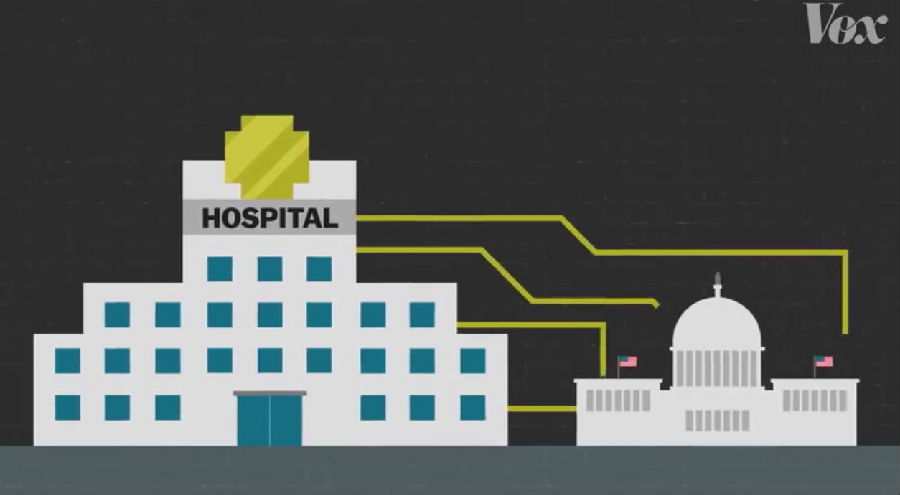In America the idea is that you'll be a consumer, that you'll do what you do when you go to Best Buy and buy a television.
在美国,我们的观念是去百思买买电视,我们要行使消费者的权益,要砍价。
But that just doesn't work in healthcare.
但这种观念在医疗行业是行不通的。
It doesn't work in healthcare because you often come and get health care when you're unconscious, in an ambulance, when you're scared,
之所以在医疗行业行不通是因为我们去医院的时候可能已经失去意识了,可能在救护车里,或是很害怕,
when it's for your spouse or your child
又或者接受治疗的是我们的爱人、孩子,
It is a time when you have the least bargaining power.
那个时候你根本没有讨价还价的能力。
You are not usually capable of saying, 'No.' You're not knowledgeable enough to do it,
你通常很难说“不”,你甚至完全想不起来要讲价,
you're not comfortable doing it, or you're not conscious enough to do it.
即便是讲价你也会不在状态,甚至完全失去讲价的能力。
That's why in other countries the government is a person who can say 'No' for you.
这就是为什么其他国家的政府能代表你跟医疗行业说“不”,
You can say, 'No, that's too expensive you're going to have to lower your price' because they do have that power.
你可以说“”不,太贵了,你们得降价“,因为政府确实有帮助患者砍价的能力。
A new push for single-payer health care right here in the US.
美国群众发起了争取全民健保的新一轮游行示威活动。
What do we want? Single-payer!
我们要什么? 全民健保
When do we want it? Now!
什么时候要?现在就要!
California and others are saying maybe we should adopt the European model.
加州等地民众呼吁,或许我们也应该效仿欧洲的医保模式。
If we decided to create a single-payer system with one of these huge price lists in the US
如果我们也实行统一收费标准的全民健保系统,

there would be nothing to stop lobbying from hospitals from doctors from drug companies,
那我们就没有办法阻止医院、医生以及医药公司游说,
and those prices would get influenced.
医疗费用也会受到影响,
So we could end up with a single-payer system that is expensive, even as expensive as our current system.
最后我们通过的全民健保可能还是会很贵,甚至可能跟我们今天的医疗系统一样贵。
It all depends on how much you negotiate down the prices
这完全取决于你能从医方那里拿到多少折扣,
and now in America these groups have so much power because they are so rich.
然而现在美国的保险公司个个能通天,因为他们不差钱,
that it's really hard to get them to bring down the prices.
所以很难让医院把价格降下来。
This is the irony of American healthcare:
所以美国医疗行业现在是骑虎难下:
It's so expensive that it's become hard to make it cheaper.
已经贵成这样了,再想把价格降下来就难了。
All that money they make, that becomes political power.
医方从医疗费用中攫取的利益已经变成了他们的政治资本。
And years and years and years of overpaying those are huge industries now.
年复一年的高额医疗费用已经带动了巨大的医疗产业。
And they have a lot of influence in Congress.
他们在国会都有很大的势力。
Under a single-payer system if we did drive prices down,
如果我们真的能把医疗费用的价格降下来,真的能实行全民健保,
doctors and hospitals, they would be paid less than they are right now.
医生和医院的收入就会降低。
That might mean some of them close or some go out of business or some move.
部分医生和医院就会面临关门,转行,或是搬家。
It would be really painful.
那时日子就不好过了。
One person's waste is another person's essential service or local hospital or their income.
一个人浪费的钱实际上是另一个人的主要收入来源或是当地医院的收入来源。
But then single-payer it's not an all-or-nothing choice.
但是,统一支付并不是没有让步的可能。
For instance, there's a really interesting section of Bernie Sander's Medicare-for-all bill.
举个例子,Bernie Sander的全民医疗法案就有一个很有意思的部分。
Where he lays out this interim plan.
他提出了一个中间方案。
It's a plan he wants while he's setting up his new single-payer system.
他想在他建设新的统一支付系统时先实行这个方案。
And in that plan, he expands Medicare to cover vision and dental.
在那个方案里,他把医保的覆盖范围扩大到了眼科和牙科。
And he opens it to nearly everyone. Not just people 65 and older.
而且把受益对象扩展到了几乎各个年龄段,而不再仅仅是65岁及以上的老年人。
All kids go on Medicare automatically and most adults can buy in.
儿童自动享有医保,大多数成年人也可自行购买。
That plan, on its own, it wouldn't get American health care spending far down overnight.
单靠这一个方案还不能让美国医疗费用的水平在一夜之间降下来,
but it would at least begin to recognize what we already know and what most other countries already do:
但它至少可以让我们认识到我们现在的医疗水平是个什么样子,其他国家又是什么水平:
That health care is one of those things the government can do cheaper and better than the private sector.
让我们认识到政府也可以在医疗上有所建树,让公共医疗保险比商业保险更实惠。


